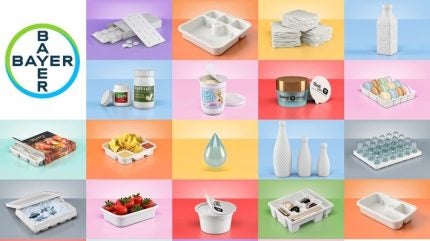
Pharmaceutical and biotechnology company Bayer has collaborated with packaging provider PAPACKS on fibre-based consumer health packaging.
The German companies are targeting an alternative to using traditional plastic packaging for Bayer brands including Aspirin, Bepanthen and Claritin.

Discover B2B Marketing That Performs
Combine business intelligence and editorial excellence to reach engaged professionals across 36 leading media platforms.
The biodegradable packaging will be made from responsible virgin fibres, featuring PAPACK’s moulded pulp technology that uses materials derived from renewable sources and a plant-based coating.
Bayer director of global packaging innovation Jesse DelGigante commented: “Reducing plastic utilisation is one of the greatest challenges of our industry, so we’re proud to accelerate progress towards using eco-friendly, renewable sources for our packaging.”
PAPACKS founder and CEO Tahsin Dag added: “We’re looking forward to the challenge of combining our pulp technology with plant-based coating with the rigorous standards mandated by regulatory agencies for over-the-counter medicines. We expect this collaboration to help redefine packaging standards for the industry.”
In late May 2024, PAPACKS signed a memorandum of understanding with industrial hemp company element6 Dynamics to expand its moulded and thermal-formed packaging in the US.

US Tariffs are shifting - will you react or anticipate?
Don’t let policy changes catch you off guard. Stay proactive with real-time data and expert analysis.
By GlobalDataBayer’s collaboration with PAPACKS follows the company’s recent announcement that it has joined the Blister Pack Collective to reduce single-use plastics in healthcare packaging.
Bayer has also previously launched an accessible QR code on its packaging for visually impaired consumers.
The pharmaceutical packaging market was valued at $127.0bn in 2023 and is expected to grow at a compound annual growth rate of more than 6% by 2030.



